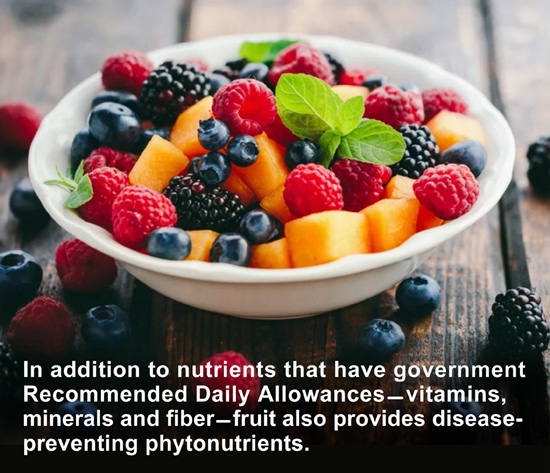Is all sugar bad for you?
We all know that refined sugar—the kind used in sweets, processed food and soda pop—contains no nutrition and loads of calories. It also makes your blood sugar skyrocket and is the primary cause of the ongoing type-2 diabetes pandemic.
But fruit also contains sugar and is frequently lumped into the “unhealthy” category—as if eating an apple is the same as eating a cookie.
The main reason for this erroneous thinking is that we live in an era of rampant diabetes, and many diabetics mistakenly think that all sugar, including the sugar in fruit, is bad for them.
A secondary reason for the vilification of fruit is the growing advocacy of low-carb diets.
At the very time research is proving the antioxidant health benefits of increasing fruit and vegetable consumption, low-carb aficionados are ditching fruit because they’re told the disease-preventing benefits are outweighed by an hidden evil—sugar!
So, is the sugar in fruit going to make you fat and give you diabetes? The short answer is no. In fact, the human body desperately needs the antioxidant phytonutrients in fruit to help prevent disease and premature aging.
The longer answer, though, requires more background.
Not all sugar is the same
All types of sugar will provide an abundance of calories, whether they are from fruit or candy bars. However, the health risks of sugar consumption are related to ingesting too many refined, or processed, sugars—not from eating the sugars that are naturally present in fruits and some vegetables.
These processed sugars are also sometimes referred to as free sugars or added sugars, since they are “added” to foods to make them sweet tasting.
Fruit contains natural sugars, which are a mix of sucrose, fructose and glucose. Processed free sugars include these same sugars, but the processing isolates them from their naturally-occurring whole food state in which all the natural constituents and synergistic nutrients are present.
In short, the processed sugars do not contain any of the other parts, or co-factors, that naturally regulate the digestion and metabolizing of the sugar contained in the fruit. So, the body is affected much more directly (and dramatically) by the nutrient-drained refined sugar.
Perhaps the most important “other” constituent in fruit is fiber—at least relative to preventing weight gain and diabetes.
The fiber helps slow the absorption of the sugar in the fruit and helps the body avoid a big blood sugar spike. With the bulkiness of fiber in fruit it would be quite difficult to consume excessive or dangerous amounts of sugar from the whole food.
But in addition to the fiber, fruit also contains micronutrients—vitamins, minerals, enzymes and antioxidants—that contribute to long-term health.
Some fruit even provides varying amounts of protein and fat macronutrients.
Clearly, simply looking at the amount of sugar in a food does not tell the full story about fruit’s nutritional profile. There is much more to a piece of fruit than its sugar content.
While an abundance of studies highlighting the health benefits of the phytonutrients found in fruit, other studies show the added sugars in baked goods, cereals and sodapop negatively impact one’s health.
The American Heart Association has reported that Americans eat an average of 17 teaspoons of added sugar per day, which is over double the recommended amount.
This added sugar has been linked to everything from inflammatory diseases and premature aging to high blood pressure, obesity and more. According to the American Heart Association, 47% of this added sugar comes from sugary drinks.
Fruit and diabetes
For most people fruit can be part of a healthy diet. People should not turn away from fruit because of its sugar content, especially since most Americans are not meeting the daily recommended amount of fruits and vegetables in their diet to begin with. Diabetics need to be more careful in how they go about it, but they still benefit considerably from fruit consumption.
The American Diabetes Association says that any fruit is fine for a person with diabetes, so long as that person is not allergic to that type of fruit. They even provide guidelines on their website.
While it’s true that the sugar in fruit can increase blood sugar to some degree, most human bodies know what to do with that sugar by secreting insulin to regulate the blood sugar level.
Having said that, eating any high-carb food in excess, including fruit, does carry the possibility of impairing the body’s ability to effectively regulate blood sugar. But what sets fruit apart from ultra-processed food is the mitigating effect of the aforementioned fiber content—allowing the sugar to absorb slowly.
On the other hand, foods with added sugar contain little to no fiber—making them much more dangerous for a diabetic as they contribute to blood sugar spikes.
Another protective step diabetics can take is to pair the fruit they eat with food that contains protein and fat. According to the American Diabetes Association this helps to further stabilize blood sugar response.
But for most people, the amount of sugar in fruit is of no concern. The body can easily digest the sugar—along with all the beneficial nutrients.
In summary, the sugar “danger” of regular fruit consumption is low for diabetics—provided they take a few precautions—and virtually non-existent for everyone else. Meanwhile the health benefits are immeasurable.
So, eat up. With surveys finding only 12% of Americans consume the recommended fruit intake, you probably need to increase yours too!
Add consider supplementing with Fruit & Veggie Plus by Optimal Health Systems to help fill in the gaps of your fruit and vegetable intake.
– – –
Sources: Diabetes.org, American Heart Association, Wikipedia-fiber, Wikipedia-insulin.



